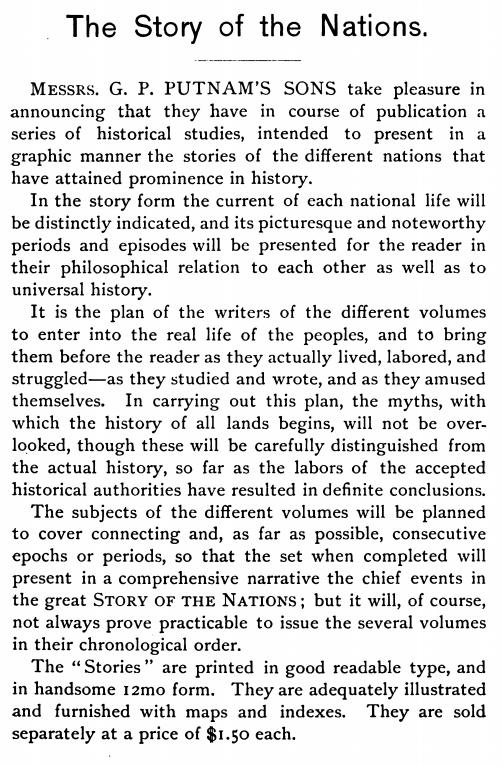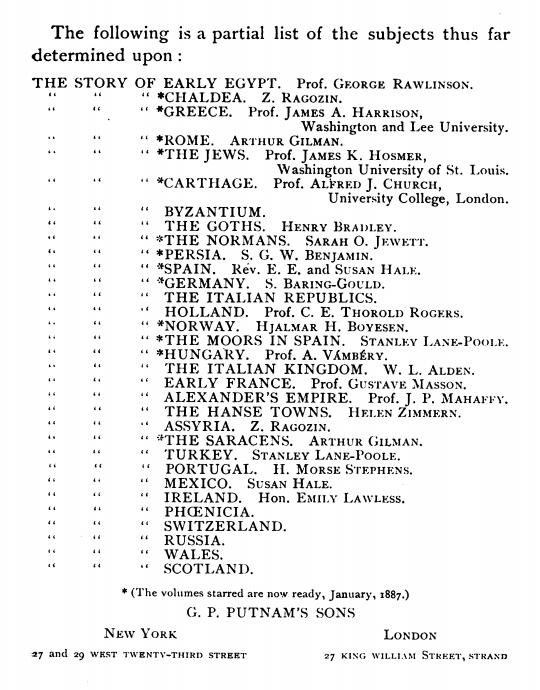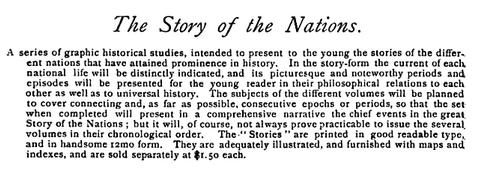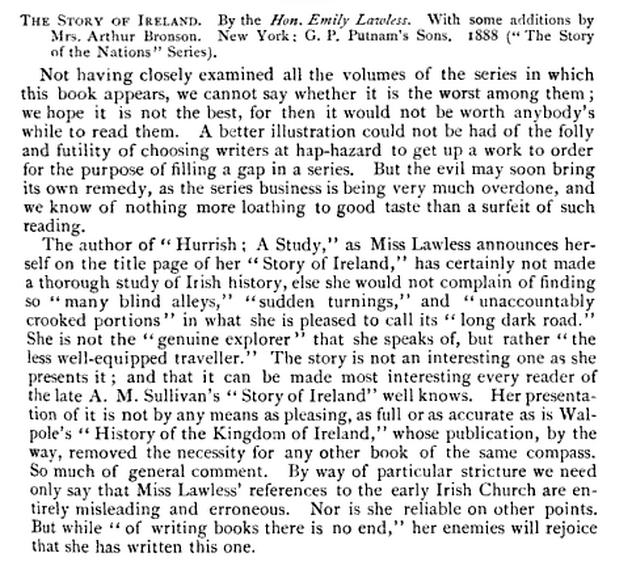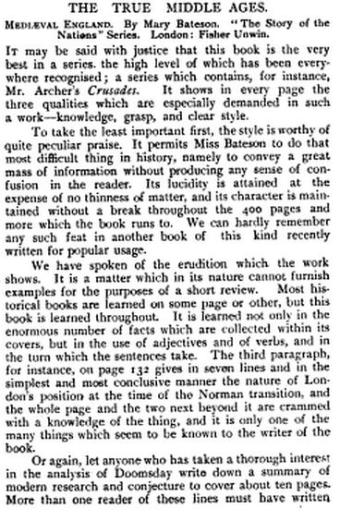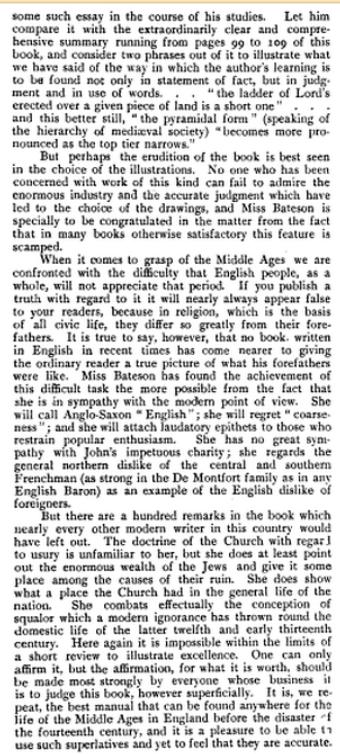says that The Story of the Nations series was founded in
1885 by London publisher T. Fisher Unwin. That Unwin
was the originator of the series is confirmed in a profile
that appears in
(1415, August 1893, pp.
168-70). When the series began is less clear.
According to listings in WorldCat, two of the series volumes
appeared before 1885:
, Sabine Baring-Gould,
1834-1924, New York, G.P. Putnam's sons; London, T.F. Unwin,
1882.
, Arthur Gilman, 1837-1909,
Unwin 1883 (2nd edition), Putnam's 1885.
However, it seems likely that both are cataloging
errors. Baring-Gould published a 2-volume history of
Germany beginning in 1879, and the 1886 copyright series
volume lists Arthur Gilman as collaborator and is originally
titled,
. The Google book of
Gilman's
, an 1888 reprint, is copyrighted 1885
and contains an 1885 preface by Gilman. However, though this
volume clearly is identified as part of the series in
publicity documents, it lacks the prospectus and title list
that appear in all of the other Putnam's volumes I have
examined. Indeed, nothing in the book indicates that
it belongs to the series. These details may suggest
that the first edition was published in Great Britain before
the series was officially under way.
The earliest American announcement of the
series I have located is an ad in
It seems clear that the series
was fully under way by 1885, when four volumes officially in
the series were printed. Thirteen more titles appeared
in 1886-7.
The prospectus below explains the
publisher's apparently final intentions for the series: a
collection of popular histories for the general
public. To date, little information about the "rules"
for the series has been uncovered, though it is likely more
facts will be found. It would be of particular
interest to be able to see the instructions the publishers
provided for authors of the series. Hjalmar Hjorth
Boyesen in his preface to
The prospectus states that readers should
expect distinctions between national myths and historical
fact, and that each volume will attempt to capture the
character of the "nation" in the epoch being examined, to
present a coherent portrait and to place that portrait
within "universal history." Presumably, then, those
who conceived of and directed the publication of the series
believed there was a coherent narrative of universal human
history that would be reflected in the various volumes, a
"great story of the nations."
The lists of titles below show that the series continued to
grow and the books remained in print at least through
1921. A survey of the series as listed in WorldCat
shows that the final title in the series was
.
After
that
date, the series gradually went out of print, only one title
being reprinted in the 1921-1930 period.
The lists reveal that the publishers and
reading public defined the term "nation" more broadly than
is generally the case in the early 21st century.
Included on the list are groups we would differentiate as
empires, nation states, regions, peoples or ethnicities,
tribes, religions, and city-states. Jewett, for
example, follows the Normans from their historical origins
as a seafaring people in Scandinavia through their emergence
as a highly mixed group of tribal peoples that were named
Normans after colonizing northern France and who then
disappeared as they merged with the peoples of the areas
they conquered in France, Italy and England. She
argues that they created a heritage of characteristic
attitudes that persisted after them, asserting that modern
Western civilization, particularly in Victorian England and
the United States, manifests this heritage. How would
21st-century readers categorize the Normans? As a
people? perhaps a tribe?
While consideration of Africa apart from
Mediterranean regions or of the pre-Columbian Americas is
not a major feature, some of the volumes give attention to
these peoples. Especially notable is Susan Hale's
(1888) which deals mainly with
pre-colonial peoples of the region. Thomas C. Dawson's
two-volume
also
provides some account of indigenous peoples before European
colonization (
). See also
George M. Theal's volume,
, though
focused on the history of colonization, gives some attention
to precolonial peoples.
Title List from Putnam's Final 1905 Printing of The
Normans --
68 titles
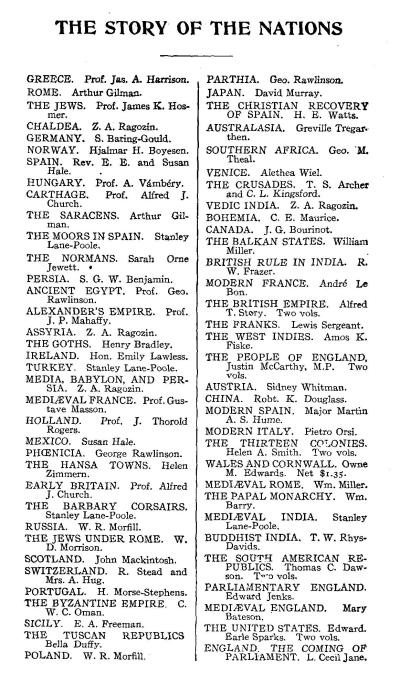 After 1905 four more titles appeared
After 1905 four more titles appeared
Greece, from the coming of the
Hellenes to A.D. 14, Evelyn S. Shuckburgh,
1843-1906, Unwin 1905, Putnam's 1906.
The Roman empire, B.C. 29-A.D. 476, Henry Stuart
Jones, 1867-1939, Unwin 1908, Putnam's 1908.
Denmark
and
Sweden:
with Iceland and Finland. Jón Stefánsson,
1862-1952, Unwin, 1916, Putnam's 1917.
Belgium
from
the
Roman invasion to the present day. Emile
Cammaerts 1878-1953, Unwin, 1921
Title list appearing in the
Cammaerts, Belgium 1921

There are quite a number of differences between the
Unwin and the Putnam's title lists.
Books that appeared under
significantly different titles.
Over the almost
three decades of the series, many titles were
simplified, as was Jewett's from
The Story of the
Normans in 1887 to
The Normans in 1891.
"The Story of ____" may have reflected the early idea
that the series would be addressed to younger readers,
but the longer titles also clearly identified each
volume with the popular series. This may explain
why Jewett's book continued to be reprinted under both
titles after 1891. Several titles, however, were
changed more radically.
Henry Edward Watts,
The
Christian
Recovery
of Spain (Putnam's 1893) was also
Spain
(Unwin 1894).
Justin McCarthy
The People of England (Putnam's,
volume
1 copyright 1898;
volume
2 1899) was also
Modern
England
Before
the Reform Bill (Unwin, copyright 1888) and
Modern
England:
From
the Reform Bill to the Present Time (Unwin,
Copyright 1899).
Greville Tregarthen
Australasia:
New South Wales, Tasmania, Western Australia, South
Australia, Victoria, Queensland, New Zealand (Putnam's
1894)
was
also
The
Australian Commonwealth (Unwin 1894).
Titles published by Putnam's, but
not by Unwin.
James Albert Harrison,
The Story of Greece
1885
Edward Everett and Susan Hale,
The Story of Spain 1886
Alfred T. Story,
The Building of the British
Empire. 2 v.
1898
Amos Kidder
Fiske, The West Indies. 1899
Helen A.
Smith, The Thirteen Colonies. 1901
Thomas C. Dawson,
The South
American Republics. 2 v. 1903
Edwin Erle Sparks,
The United States of
America. 2 v. 1904 Probably v.
1;
v.
2
(Note that the Putnam's title list gives his name as
Edward Earle Sparks.)
Titles published by Unwin,
but not by Putnam's
Emile Cammaerts, Belgium from the Roman
Invasion to the Present Day. Unwin, 1921
Titles that Unwin delayed publishing
in England
Hjalmar
Hjorth Boyesen, The
Story of Norway. Putnam's
1886, Unwin 1899
Sarah Orne Jewett, The Story of the Normans.
Putnam's
1887,
Unwin 1891
It appears that Unwin was conservative about
accepting titles first published by Putnam's. This
is reflected both in the number of Putnam's titles that
Unwin did not print and in the two titles Unwin delayed
publishing. One may speculate that some of these
choices arose from uneasiness about the early decision,
later retracted, to market the series to young
readers. Harrison's
The Story of Greece
deals primarily with Classical Greece, while Shuckburgh
focuses on Hellenistic Greece, and Harrison's text was
among the earliest in the series, representing a serious
but not well-reviewed attempt to address younger readers
(
see review below).
Boyesen's
Norway ends with
the original Putnam's prospectus, which states that the
target audience for the series is young readers, and as
noted above, his "preface" indicates that he made
concessions to such readers, deviating from conventional
historical narrative. Likewise, the Hales'
Spain
explicitly addressed young readers:
It has been, therefore, a part of our plan
in following the Story of Spain, to refer, from
chapter to chapter, to such illustrations from the
writings of various authors of different countries, as
might interest young readers and tempt them to follow,
not only the history of Spain in its chronological
order, but the series of writings which in romance, in
poetry, and in other literature we owe to her
suggestions. (vi)
In a letter of 12/17/1890, G. H. Putnam
wrote to Jewett that "Mr. Unwin, the London publisher
of the 'Story of the Nations' series, has finally
offered to take a set of the plates of the 'Story of
the Normans' ...." That Unwin has "finally
offered" suggests that Putnam had some difficulty
persuading Unwin that Jewett's title would be
successful in England. Another hint of this
difficulty is that Unwin chose The Normans as
number 29 in the British series, whereas it had been
chosen perhaps at the inauguration of the American
series and published eleventh or twelfth.
For a discussion of differences
between Rodway and Fiske on the West Indies, see
Karen Fog Olwig, Small
Islands,
Large
Questions: Society, Culture and Resistance in
the Post-Emancipation Caribbean (New York: Frank
Cass, 1995), 16-7.
The Story of the Normans within the Series
The Story of the Normans appeared
near
the
beginning of the Putnam's series, The Story of the
Nations. The first printing in early 1887
lists seventeen volumes. The prospectus for
the series in the 1887 volume announced that twelve
titles were currently available. Ten or eleven
of these appear to have been completed and published
before Jewett's title.
The list below of the titles
advertised as available in the 1887 edition confirms
that the series was inaugurated in 1885, with books
on Greece and on the Jews. Several in the
series appeared in 1886, making it likely that
Jewett was able to look at more than one as she was
completing what, for her, was a new kind of
writing. She sent her final copy to Putnam's
in December of 1886.
WorldCat provides publication
dates
for the additional sixteen titles from the
1887 edition list.
Many of the volumes in the
series are available on-line. I have
provided links to several, but not all.
The Story of Rome,
Gilman, Arthur, 1837-1909. New York: G.P.
Putnam's Sons, 1886 (copyright 1885).
Link
to
1888
printing.
The Story of the Jews: ancient, medićval, and
modern, Hosmer, James K. 1834-1927. New York:
G.P. Putnam's Sons, 1885.
The Story of Greece, Harrison, James
Albert, 1848-1911. New York: G.P. Putnam's
Sons, 1885.
Link
to
1893
printing.
The Story of Carthage, Church, Alfred John,
1829-1912. Gilman, Arthur, New York, London, G.P.
Putnam's Sons, 1885.
The Story of Chaldea, from the Earliest times to
the Rise of Assyria (treated as a general
introduction to the study of ancient history),
Ragozin, Zénaďde A. 1835-1924. New York, Putnam,
1886.
Link
to
1886 printing.
The
Story
of
Germany, Baring-Gould, S.
1834-1924. Gilman, Arthur, New York & London,
G.P. Putnam's Sons, 1886.
Link
to
1893
printing.
The
Story
of
Norway, Boyesen, Hjalmar Hjorth,
1848-1895. New York London, G.P. Putnam's Sons,
1886.
The
Story
of
Spain, Hale, Edward Everett, Sr.,
1822-1909. Hale, Susan, New York, London, G.P.
Putnam's Sons, 1886.
The Story of Hungary, Vámbéry, Ármin,
1832-1913. Heilprin, Louis, New York, London, G.P.
Putnam, 1886.
The Story of the Saracens, from the Earliest
times to the Fall of Bagdad, Gilman, Arthur,
1837-1909. New York, London, G.P. Putnam's Sons,
1891, ©1886.
Link
to
the
1902 printing.
The Moors in Spain, Lane-Poole, Stanley,
1854-1931. Gilman, Arthur, New York And London, G.P.
Putnam's Sons 1888.
©1886.
WorldCat lists the London, T.
Fisher Unwin edition as appearing in 1886.
Link
to
the 1911 printing.
The Story of the Normans, Jewett,
Sarah Orne, 1849-1909. New York, G. P.
Putnam's sons, 1887, ©1886.
The Story of Persia, Benjamin, S. G.
W. 1837-1914. New York and London, G.P. Putnam's
Sons, 1887.
The Story of Ancient Egypt, Rawlinson,
George,
1812-1902.
Gilman, Arthur, New York, London, G.P. Putnam, 1887
.
The Story of Alexander's Empire, Mahaffy,
John
P.
New York: Putnam, 1887.
The Story of Assyria from the Rise of the Empire
to the fall of Nineveh: continued from "The Story
of Chaldea," Ragozin, Zénaďde A.
1835-1924. New York; London: G.P. Putnam's sons,
1887.
The Story of the Goths from the earliest times to
the end of the Gothic dominion in Spain.
Bradley, Henry, 1845-1923. New York, G.P. Putnam's
Sons, 1888.
WorldCat lists a London, T.
Fisher Unwin edition as appearing in 1887.
Link
to
the
1891 printing.
Authors in the Series
Though many of the authors were
professional historians, others chosen for this series
come from a variety of backgrounds. A number, like
Jewett, lacked training as historians, but were
successful writers who brought personal experience and
interest to their projects. Following are sketches
of a selection of the authors, emphasizing those who
were not academic historians.
Mary Bateson (1865-1906)
Wikipedia
Perhaps the only woman author in the
series who was an academic historian, Bateson was the
author of
Medieval
England (1903), the volume that took up the
history of England after the Norman conquest.
Samuel Greene Wheeler Benjamin (1837-1914) Wikipedia
Author of
Persia 1887,
Benjamin was born in Greece of American
missionaries. He was a journalist and author who
served two years (1883-4) as the first American
Minister to Persia. He also wrote
Art in
America:
a Critical and Historical Sketch
1880.
Sir John George Bourinot (1836-1902) Wikipedia
Author of
Canada 1896,
Bourinot was a Canadian journalist, historian, and civil
servant, self-taught after two years at Trinity College,
Toronto.
Bella Duffy (d. 1926) Circulating
Library
Author of
The Tuscan Republics
1892, Duffy wrote mainly non-fiction, notably a
biography of Madame de Staël (1887).
Robert Watson Frazer LLB (1854-1921)
Indian
Biographical Dictionary
Author of
British India 1896,
Frazer served as a British civil servant in India,
before returning to England to lecture at the London
Institution. He wrote extensively about Indian
history and culture.
Edward Augustus Freeman (1823-1892) Wikipedia
Author of Sicily (1892), Freeman was
an eminent British historian, at the time considered the
foremost expert on the Norman conquest of England,
having published a 5-volume account (1870-1876). He was
Jewett's main source for The Story of the Normans.
Arthur Gilman (1837-1909) Wikipedia
Gilman, educator and historian, became an
advocate for women's higher education. He was a
founder of the Harvard Annex in 1879, which eventually
became Radcliffe College. He authored the volumes
on Rome and the Saracens, and he is identified on the
various lists above as co-author of the titles on
Germany, Carthage, Egypt and the Moors. That he
authored one of the first two volumes and assisted in
several others suggests that Putnam's was pleased with
his writing and may have seen him as a "fixer," someone
who could bring problematic texts into line with the
series' aims. Perhaps he even was an originator of
the series.
Gilman's residence in Cambridge, MA
after 1870 and his association with the Riverside Press
and the Harvard Annex make it likely that he was
acquainted with John T. and Annie Fields. This
makes it possible that Gilman recruited Jewett for
The
Story
of
the Normans.
Edward Everett Hale (1822-1909) Wikipedia
Hale probably is best remembered as
the author of
The Man Without a Country
(1863). Trained for the Unitarian ministry at
Harvard College and Divinity School, Hale wrote fiction
and history in addition to serving as a pastor. He
collaborated with his sister, Susan Hale, to produce
The
Story
of
Spain 1886.
Susan Hale (1833-1910) Wikipedia
The sister of Edward Everett Hale,
Susan Hale was an educator, author, traveler and
artist. She collaborated with her brother to
produce a volume on Spain, a country upon which she had
written earlier in
A Family Flight through Spain
1883. She also wrote the
Mexico volume for
The Story of the Nations.
Stanley Edward Lane-Poole (1854-1931)Wikipedia
Lane-Poole was a British orientalist
and archaeologist for the British Museum, on site in
Egypt. He eventually became professor of Arabic
Studies at University of Dublin. As useful to the
series as Gilman, he contributed four volumes on the
Moors, Turkey, the Barbary Corsairs and Medieval India.
Emily Lawless (1845-1913) Ricorso
link
Author of
Ireland
1887, Lawless was an Irish novelist and poet from County
Kildare.
Gutenberg
Text
Zénaďde Alexeďevna Ragozin (1835-1924) Wikipedia
Born in Russia, Ragozin emigrated to
the United States in 1874. A self-educated author
and traveler, she became one of the stable of writers on
whom Putnam's depended. She produced four titles
in this series during 1886-1895 on Chaldea, Assyria,
Media, and Vedic India. She later produced several
volumes for another Putnam's series, Tales of the Heroic
Age.
Canon George Rawlinson (1812-1902) Wikipedia
Educated at Oxford University,
Rawlinson was British scholar, historian, and Christian
theologian, who became a professor of Ancient History at
Oxford. He authored three volumes in the series,
on Egypt, Phoenicia and Parthia.
Helen Ainslee Smith (1857-1932) Newberry
Library
Author of the two volume title,
The
Thirteen Colonies 1901, Smith wrote popular books
on a variety of topics, including the great cities of
the ancient world, great cities of the modern world and
American biography. Under the pseudonym, Hazel
Shepard, she authored juvenile titles on topics such as
birds and fishes and histories of Russia and of Japan.
Henry Edward Watts (1826-1904) Wikipedia
Author of
The Christian Recovery
of Spain 1893, Watts was a British journalist and
author on Spanish topics. He is best known for his
translation of Cervantes,
Don Quixote 1888.
Alethea Wiel (b. 1851-1929) Encyclopedia
Americana see p. 143.
Author of
Venice 1894, Wiel wrote a
number of popular histories, as well as biography and
magazine pieces, mainly about Italian culture and
history. Born Alethea Jane Lawley, she married the
historian, Taddeo Wiel.
Helen Zimmern (1846-1934) Wikipedia
Author of
The Hansa Towns
1891, Zimmern was a German-British writer and
translator of fiction and cultural criticism, including
works of her friend, Friedrich Nietzsche.
Marketing and Reviewing of the
Series
Following is a sampling of sources and
materials related to the series. These are
materials I examined in order to determine how the
publishers envisioned the audience for the series.
It appears that the series
initially was intended for young readers and was so
advertised in Publishers Weekly. However,
early reviewers were unimpressed with what they saw as
authors' failed attempts to cater to young
readers. The selections from prefaces by Harrison
(Greece) and Hosmer (Jews) indicate that they were
"instructed" to target a juvenile audience, and that
Hosmer in particular struggled with this as a major
problem in composing The Story of the Jews.
Both
publishers
seem to have dropped the notion of marketing the series
as for young readers by the time they printed The
Story of the Normans, for that element is removed
from the description of the series in the prospectus,
and at about the same time, the audience specification
disappears from PW ads. Reviewers,
however, continued to describe the series as for young
readers at least through 1887.
This information leaves open the
question of how Jewett envisioned her audience as she
composed the book. Almost certainly, she did much
of her work while her publisher was thinking of the
series as for young readers, but Jewett also was able to
read early titles and reviews and may well have received
new instructions before completing her work. Atlantic's
review of her volume noted that it did not seem to
be addressed to juvenile readers, though in reviews of
earlier titles, Atlantic had paid attention to
this question.
The text of this ad differs from the
prospectus in the 1887 printing of
The Story of the
Normans. Notice the first sentence varies:
"... intended to present
to the young the
stories of the different nations...." (my
underlining). A similar ad with the same first
sentence appears in the
September
26, 1885 issue of
Publishers Weekly.
The
PW ad that appears in
February
1887, a month after the release of
The Story
of the Normans, drops the first two sentences,
beginning with "The subjects of ...." (280).
Reviews of Selected Titles in the Series
Atlantic Monthly
The Atlantic Monthly
Volume
0056 Issue 337 (November
1885)
Title: Books of the Month [pp. 717-720]
From 718-9.
The Story of Greece, by James A. Harrison (Putnam's)
is the first in a series entitled The Story of the
Nations.... The first suggestion which the title
of this volume and series presents is that the
publishers or editors are uneasy lest they should
happen to be offering something dull. History is
history, and this book aims at giving the history of
Greece in a compact form, but not a dessicated
form. In his anxiety, however, not to be dry,
Mr. Harrison has rushed to the other extreme, and
irritates the reasonable reader by his jocularity and
forced vivacity. The young reader is aimed at,
but the young reader, we hope, does not need to be
treated as if he were a poor blasé creature, who has
had a surfeit of fiction, and now must be cajoled back
into honest history.
From the Preface of the 1893
printing of
The Story of Greece, iv.
An effort has been made in this work to catch and fix
the salient outlines of the History of Greece .., and
to throw them into a story form which, rid of
technicality and superfluous learning, might attract
the mind of younger readers and whet their appetites
for the larger and more detailed histories of the
scientific historians. Wherever it was possible, the
great and beautiful deeds, the fine stories, the
narratives of admirable actions, the stirring and
illustrative anecdotes to be found in the ancient
writers, have been chosen to describe Greek life and
civilization in preference to a dry chronicle of dates
and events, which would simply repel without
instructing.
(Preface
iv)
The Atlantic Monthly
Volume 0057 Issue 340 (February 1886)
Title: Books of the Month [pp. 284-288]
From p. 284
The Story of Rome, from the earliest times to the end
of the republic, by Arthur Gilman, is the second in
the series entitled The Story of the Nations.
(Putnams.) The plan of the series supposes a lighter
vein in the historical treatment than is ordinarily
adopted, but does not therefore exclude exactness of
statement. Mr. Gilman, like his predecessor Mr.
Harrison, means to give in familiar form the results
of historical students, and we think he is more
successful than the former. His proportions are
better, and we are spared the too jocular tone. The
style is generally clear without being elegant, and
one gets the impression of a good piece of task-work,
rather than a fresh, individual book, forced out of
one from his full knowledge and strong interest.
The Atlantic Monthly
Volume 0057 Issue 343 (May 1886)
Title: Books of the Month [pp. 717-720]
From p. 717
The Story of the Jews, by James K. Hosmer (Putnams),
is a most interesting narrative, which is very far
removed from a paraphrase of the Old Testament, since
most of the volume is given to a sketch of the Jewish
people from the fall of Jerusalem to the present day.
Mr. Hosmer has been stirred by his subject to
something very like eloquence, and fortunately has not
concerned himself to ask the age of his audience.
The Atlantic Monthly
Volume 0058 Issue 349 (November 1886)
Title: Books of the Month [pp. 718-720]
From p. 720
In the series The Story of the Nations, three new
volumes have appeared: The Story of Germany, by S.
Baring-Gould, with the collaboration of Arthur Gilman;
the Story of Norway, by H. H. Boyesen; and the Story
of Hungary, by Arminius Vámbéry, with the
collaboration of Louis Heilprin. (Putnams.) Mr.
Boyesen has had somewhat the easiest task, and we
think he has performed it the most satisfactorily. He
has written a popular history of a compact people, and
has done his work seriously and apparently faithfully.
To give the story of Germany was a much more difficult
matter, but the central idea of showing the
development of the imperial principle was a good one,
and has been kept in mind with some steadiness. It
strikes us, however, that in his eagerness to be
bright and lively Mr. Baring-Gould has crowded in a
good deal of detail to the exclusion of strong leading
lines. We wish, for example, that he had made more
clear the real meaning of Protestantism. It seems a
pity that Mr. Vámbéry
should not have
given a fuller and clearer statement of the recent
constitutional questions. The illustrations in the
first two books, especially in Germany, are capital;
those in Hungary are inferior.
The Atlantic Monthly
Volume 0059 Issue 353 (March 1887)
Title: Books of the Month [pp. 430-432B]
From p. 431
Books for Young People. — In The Story
of the Nations Series (Putnams) two new volumes have
been received: The Story of the Moors in Spain, by
Stanley Lane-Poole, and The Story of the Saracens from
the Earliest Times to the Fall of Bagdad, by Arthur
Gilman. They supplement each other, and while the
former has the advantage of a more localized treatment
and a closer connection with what is familiar in
history and travel, the latter tells a story which
centres mainly about a great historical personage.
Both are discreetly illustrated, and Mr. Gilman's has
an excellent bibliography attached to it.
NOTE: This is the first of the
Atlantic
reviews of the series to be placed under the heading
"Books for Young People." Previous reviews
appeared under "History." In February 1888, the
next title reviewed in
Atlantic also appears
under Books for Young People, but in June 1888 and for
some time after, they appear under "History."
The
Atlantic review of
The Story of the
Normans appears under "History" in
June 1887; the reviewer
says, "This book belongs to a series designed in a
general way for young people, but there is little in
Miss Jewett's treatment which especially calls up such
an audience" (859).
Overland
monthly
and
Out West Magazine. (June 1886)
Title: Book Reviews [pp. 659-666]
From pp. 665-6
The Story of the Nations.
Some time ago an extensive series of volumes was
announced by J. P Putnam's Sons, under the general
title of "The Story of the Nations." Its plan was one
whose happy execution is attended with very great
difficulties. It was proposed to present to the young
reader "in the story form the current of each national
life, and its picturesque and noteworthy periods and
episodes, in their philosophical relation to each
other, as well as to universal history; to enter into
the real life of the peoples, and to bring them before
the reader as they actually lived, labored and
struggled." Here is certainly an ambitious project,
and not the least ambitious phase of it is, that all
this is to be given to the "young reader." The
fundamental misconception which underlies this
undertaking is, that any subject within the range of
human knowledge may be made "easy" simply by a
peculiar form of statement, and that all that is
necessary to make clear to the miniature mind "the
current of each national life and its picturesque and
noteworthy periods and episodes, in their
philosophical relation to each other, as well as to
universal history," is simply to reduce it to the form
of a story. It seems never to occur to the projectors
of such plans, that there are some things which from
their very nature are difficult of comprehension, and
that in order to their comprehension there is required
a considerable degree of intellectual maturity. Among
these things are the topics which it is here proposed
to present to the young reader. The "philosophical
relation" of events and epochs in the history of the
world is difficult for the immature mind, not because
the language of the masters of historical writing
presents any special difficulties; the difficulty lies
in the conception itself, and no attempt to weave it
into the a "story form" is likely to make it easier of
apprehension.
The volumes on
Greece, Rome,
and
The Jews, possess certain qualities in
common, although by different writers. They all lack a
simple, plain, and direct style. They contain an
abundance of that information which ought very early
to find its way to the mind of youth, and the
publisher has done his part to make the volumes
attractive, but the text does not rise much above the
work of literary hacks. But the latest volume,
The
Story of Chaldea, by Zénaďde A. Rogozin, is a
meritorious compilation from the writings, Layard.
Rawlinson, Lenomant, and others.
From the preface to Hosmer, The
Story of the Jews 1885,
pp. iii-v
To write "The Story of the Jews"
for the series in which it is to appear has been a
task beset with certain special embarrassments.
In the first place, it may
reasonably be doubted whether a faithfully related
story of the Jews is suitable reading for immature
minds. The prudent parent shrinks from putting into
the hands of his child Hamlet, or Lear, or Othello. In
the first, the terrible soul agony, -- in the second,
the ruthless exercise of the most savage passions, --
in the third, the malignant, snake-like craft crushing
in its folds unsuspecting manly worth and womanly
loveliness, -- this tragedy of the deepest requires
full maturity in order that its lessons may be
intelligently received and its power fully realized.
Such literature is meat for men, not milk for babes;
and it is quite premature to undertake it, until
experience has thoroughly settled the character. Has
not history as well as poetry its tragedies quite too
sombre for childhood, -- and among its tragedies is
there any quite so dark as the story of the Jews?
Where else are problems presented which so defy
satisfactory solution? Where else is it necessary to
contemplate the play of spiritual forces so
tremendous? Where else is there anguish so deep
and long-continued?...
The writer of this volume has dealt
with these embarrassments as well as he could. As to
the first, interpreting in a liberal way his
commission "to write a story for the young," he has
tried to adapt his chapters to those in the later
stages of youth, -- to those, indeed, already standing
upon the threshold of maturity. Prominence has been
given to the more picturesque and dramatic features of
the record. The profundities are only touched upon;
the mysteries of the Cabala, and the inspiration that
may lie within the fantastic rhapsodizing of the
Talmudists, no attempt has been made to fathom. At the
same time, there has been no effort to dwarf and
emasculate the absorbing account into the dimensions
of a proper " juvenile." Here are details of
exterminating warfare, of sharpest torture, of
bitterest cursing. Here are presented sages as they
study the darkest problems, -- poets, as they thrill
the human heart-strings with marvellous, subtle power;
-- characters shining in the very beauty of holiness,
-- characters, too, black with malignity most
appalling. All this stands in the record: to present
Israel faithfully, these traits must be given, and the
attempt has been made to present Israel faithfully. A
tale, it is, full of thrilling fascination and
fruitful in instruction; a tale, however, that sobers
and that requires soberness in its readers, -- the
ripeness which comes when childhood has been left
behind.
Miscellaneous
Title: New Publications [pp. 283-288]
From p. 287
The Story of Chaldea by Zénaďde Rogozin
This belongs to the "Story of the Nations" series, and
is one of the best, if not the best, of the series so
far. It is free from that very apparent stooping down
to the minds of young people which characterized some
of the preceding volumes of this series. Boys and
girls always resent a too evident patronage of manner.
The Story of Chaldea may be read by old and
young with profit and pleasure. The illustrations are
excellent, and are of real benefit in illustrating the
text.
Volume 0047 Issue 210 (September
1887)
Title: Current Literature: The Story of
Carthage. Alfred J. Church [pp. 228-230]
An extended descriptive review, which
concludes: "Altogether the work may be welcomed as
a valuable addition to our historical literature."
The
American
Catholic
Quarterly Review, Volume 13 (1888), p. 191
North American Review 146
(1888), p. 357.
New Englander and Yale Review
48 (1888), 131-7.
From an extended review by William L.
Kingsley.
It is ... fortunate
that the Messrs. Putnams have added the "Story of
Ireland" to the series to which they have given the name
the "Story of the Nations." This little volume
will very soon satisfy the reader as to the reasons of
the present wretched condition of Ireland, and will
perhaps draw out warm sympathy for its people; but the
question of Home Rule is a larger and a more difficult
one. Even the authoress of the "Story" offers no
decided opinion.
The Speaker (9 July
1904), 342-3.
Compilation and commentary by Terry
Heller, Coe College
January 2015, corrected in March 2023
